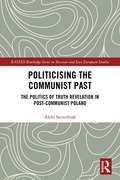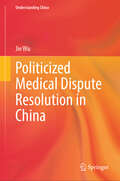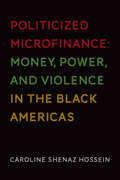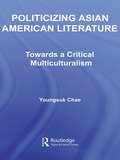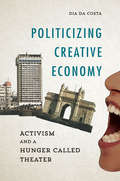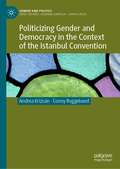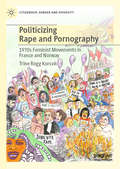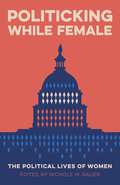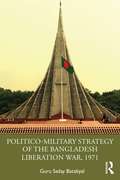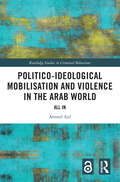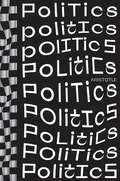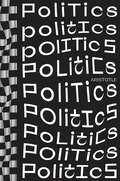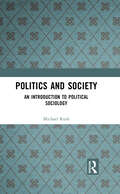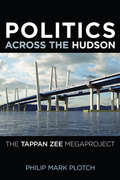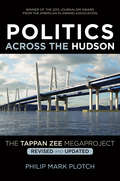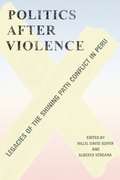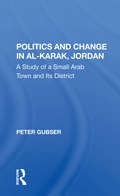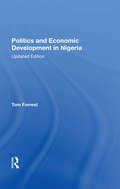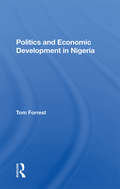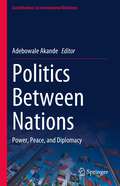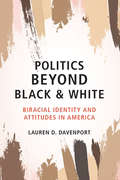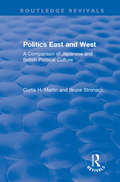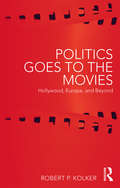- Table View
- List View
Politicising the Communist Past: The Politics of Truth Revelation in Post-Communist Poland (BASEES/Routledge Series on Russian and East European Studies)
by Aleks SzczerbiakPoland is a particularly interesting case of truth revelation and transitional justice in a post-communist country. This is because of the radical change of trajectory in its approach to dealing with the communist past, and the profound effect this had on Polish politics. The approach moved from 'communist-forgiving' in the early 1990s, to a mild law vetting individuals for their links with the communist-era security services at the end of the decade, through to a more radical vetting and opening up of the communist security service files in the mid-2000s. This book examines the detail of this changing approach. It explains why disagreements about transitional justice became so prominent, to the extent that they constituted one of the main causes of political divisions. It sets the Polish approach in the wider context of transitional justice and truth revelation, drawing out the lessons for newly emerging democracies, both in Eastern Europe and beyond.
Politicized Medical Dispute Resolution in China (Understanding China)
by Jie WuThis book investigates the politicization process of social dispute resolution and its unintended consequences, under the context of over 70 percent of China’s public hospitals have experienced hospital violence, with patients acting violently toward medical workers to express anger, protect their rights, or monetary reasons. The examination of interactions between patients, hospitals, and government representatives in China is based on fieldwork conducted in a Chinese mega-city from 2015 to 2017, combining over 700 archival mediation cases, 156 hospital violence cases and their legal outcomes, and 72 in-depth interviews with patients, mediators, and healthcare professionals. It examines the rise of mediation and finds how the party-state utilizes the traditional mediation channel to address emerging social disputes, and the art of persuasion in mediation and finds how political stability and moral concerns influence and shaped their strategies and mediation outcomes. The first-hand data and valuable archival documents help depict citizens’ social dispute resolution process and reflect another facet of non-electoral political participation in China, also enriching the understanding of evolving government strategies in dispute resolution. This book is reader-friendly and could engage a wide and dynamic audience of researchers, healthcare professionals, and readers interested in medical sociology, regional study, or political participation in China.
Politicized Microfinance: Money, Power, and Violence in the Black Americas
by Caroline Shenaz HosseinWhen Grameen Bank was awarded the Nobel Peace Prize in 2006, microfinance was lauded as an important contributor to the economic development of the Global South. However, political scandals, mission-drift, and excessive commercialization have tarnished this example of responsible or inclusive financial development. Politicized Microfinance insightfully discusses exclusion while providing a path towards redemption. In this work, Caroline Shenaz Hossein explores the politics, histories and social prejudices that have shaped the legacy of microbanking in Grenada, Guyana, Haiti, Jamaica and Trinidad. Writing from a feminist perspective, Hossein's analysis is rooted in original qualitative data and offers multiple solutions that prioritize the needs of marginalized and historically oppressed people of African descent. A must read for scholars of political economy, diaspora studies, social economy, women's studies, as well as development practitioners, Politicized Microfinance convincingly deftly argues for microfinance to return to its origins as a political tool, fighting for those living in the margins.
Politicizing Asian American Literature: Towards a Critical Multiculturalism (Studies in Asian Americans)
by Youngsuk ChaeThis book examines U.S. multiculturalism from the perspective of Asian American writings, drawing contrasts between politically acquiescent multiculturalism and politically conscious multiculturalism. Chae discusses the works of writers who have highlighted a critical awareness of Asian Americans’ social and economic status and their position as 'unassimilable aliens', 'yellow perils', 'coolies', 'modern-day high tech coolies', or as a 'model minority', which were ideologically woven through the complex interactions of capital and labor in the U.S. cultural and labor history. Chae suggests that more productive means of analysis must be brought to the understanding of Asian American writings, many of which have been attempting to raise awareness of the politicizing effects of U.S. multiculturalism.
Politicizing Creative Economy: Activism and a Hunger Called Theater
by Dia Da CostaScholars increasingly view the arts, creativity, and the creative economy as engines for regenerating global citizenship, renewing decayed local economies, and nurturing a new type of all-inclusive politics. Dia Da Costa delves into these ideas with a critical ethnography of two activist performance groups in India: the Communist-affiliated Jana Natya Manch, and Bhutan Theatre, a community-based group of the indigenous Chhara people. As Da Costa shows, commodification, heritage, and management discussions inevitably creep into performance. Yet the ability of performance to undermine such subtle invasions make street theater a crucial site for considering what counts as creativity in the cultural politics of creative economy. Da Costa explores the precarious lives, livelihoods, and ideologies at the intersection of heritage projects, planning discourse, and activist performance. By analyzing the creators, performers, and activists involved--individuals at the margins of creative economy as well as society--Da Costa builds a provocative argument. Their creative economy practices may survive, challenge, and even reinforce the economies of death, displacement, and divisiveness used by the urban poor to survive.
Politicizing Gender and Democracy in the Context of the Istanbul Convention (Gender and Politics)
by Conny Roggeband Andrea KrizsánThis book examines opposition to the Council of Europe’s Istanbul Convention and its consequences for the politics of violence against women in four countries of Central and Eastern Europe. Krizsán and Roggeband discuss why and how successful anti-gender mobilizations managed to obstruct ratification of the Convention or push for withdrawal from it. They show how resistance to the Convention significantly redraws debates on violence against women and has consequences for policies, women’s rights advocacy, and gender-equal democracy.
Politicizing Rape and Pornography: 1970s Feminist Movements in France and Norway (Citizenship, Gender and Diversity)
by Trine Rogg KorsvikThis book examines how feminist movements in Norway and France have politicized rape, pornography and sexual exploitation of women from the 1970s to the present. Through a cross-national comparison, it provides insights into why the fight against rape became top priority for French feminists in the 1970s; what kind of strategies the feminist movements used when politicizing sex and violence; who the opponents of the feminist mobilizations were, and who the allies were; as well as what the feminist movements achieved and what the costs of the battles were. This book provides historical context for contemporary and contentious debates about the tension between feminism and sexual freedom, about sexual liberation and abuse, and about the limits of freedom of expression. This text is relevant for students in history, sociology, health, political science, comparative politics and interdisciplinary gender studies. It is also relevant for researchers and activists who are concerned with the history of feminism, feminist politics and sexual politics.
Politicking While Female: The Political Lives of Women
by Robert Mann Monica C. Schneider Mary-Kate Lizotte David Andersen Rosalyn Cooperman Tessa Ditonto Sylvia Gonzalez Mirya Holman Danielle Lemi Anna Mahoney Meghan Kearney Carly Shaffer Jennie Sweet-CushmanPoliticking While Female traces the challenges and opportunities that shape the experiences of women who pursue and hold positions of political leadership in the United States. In this volume, Nichole M. Bauer gathers new essays studying the forces that keep women out of political institutions, along with the hurdles faced by female candidates and politicians once they overcome those barriers. Drawing on recent, original data, Politicking While Female examines the life cycle of a woman’s political career. The first section charts the development of political identities that shape women’s participation in politics as voters and as potential candidates, with attention to the patterns of socialization that can discourage women from seeing themselves as political leaders. The next two sections focus on the process of deciding to run for public office, especially the crucial role of mentors, and the challenges female candidates face when campaigning, as they work to raise money, develop effective messages, and overcome voter biases regarding women in leadership roles. The final section explores how women govern once in office, showing the impact of having larger numbers of women in positions of political power. A valuable resource for students, scholars, and voters of all backgrounds, Politicking While Female: The Political Lives of Women offers a comprehensive and accessible collection of essays, supported by new research and analysis, that captures central debates in the study of gender and politics.
Politico-Military Strategy of the Bangladesh Liberation War, 1971
by Guru Saday BatabyalThis book critically examines the politico-military strategy of India, Pakistan, and Bangladesh during the Bangladesh Liberation War of 1971. What began as a power struggle and cultural conflict between West and East Pakistan, later compelled India to intervene—an intervention that decisively shaped and influenced the geo-politics of the region and the global order. This volume is a systematic study of the situation of events, operational art and tactics, cold war politics, international reactions, and their impact on the formulation of the national grand strategy of all three nations. The book discusses various key themes such as the creation of Pakistan and events leading to its secession, the military geography of East Pakistan, state of armed forces of India and Pakistan and India’s humanitarian intervention, the role of Mukti Bahini, and the ambiguous stance of the United Nations in the war. The book offers an appraisal of the performances of the opposing forces and reflects on the inevitability of war and its outcome. It also gives an overview of the state formation of the three nations, encompassing the defining moments of the modern history of these South Asian countries and highlighting the socio-economic progress they have made half a century after the liberation war. A compelling treatise in the history of politico-military strategy, this book will be of interest to scholars and researchers of politics and international relations, partition studies, modern history, military history, South Asian studies, international security, defence and strategic studies, language politics, Islamic history, and refugee and diaspora studies. It will also appeal to general readers interested in the histories of Bangladesh, Pakistan, and India.
Politico-ideological Mobilisation and Violence in the Arab World: All In (Routledge Studies in Criminal Behaviour)
by Ahmed AjilThis book presents a study of politico-ideological mobilisation and violence by focusing on the life stories, trajectories and narratives of individuals who mobilised for causes and conflicts in the Arab World. It provides a greater understanding of the biographical, sociological, political and historic factors pertinent for their radicalisation processes. What makes individuals identify with suffering and injustice, often of others and elsewhere? Why do individuals feel the need to stand up in the first place and how does violent action become a justifiable or necessary course of action? Why and how do they disengage from violence? This book, based on interviews conducted in Lebanon, Switzerland, and Canada, answers these questions. It presents new theoretical insights about politico-ideological mobilisation and violence. By focusing on grievances and grounding analysis in the empirical reality as it is shared and narratively constructed by those who are at the heart of the phenomenon, it moves beyond the moralistic and politicised debates that characterise the field. Interviewees include non-violent and violent engagement for causes and conflicts related to the Arab World, such as sympathisers or members of groups and causes from a variety of ideological orientations, including Shiite militias, Salafi-jihadist groups, radical left-wing groups, Palestine-specific, Kurdish groups, and others such as right-wing or unspecified affiliations. By choosing individuals with different forms of political engagement, both non-violent and violent, and different ideological orientations, it helps readers to get a better grasp of how similar grievances may lead to different outcomes. In focusing on three markedly different geopolitical contexts, the book also provides a crosscontextual understanding of mobilisation for political and violent action. The interviewees also include experts and peripheral actors such as professionals, researchers, policymakers, friends, or family members. Their perspectives complement and enrich some of the findings by providing external yet in-depth ‘expert knowledge’. Politico-ideological Mobilisation and Violence in the Arab World will be of great interest to criminologists, political scientists, sociologists, and other scholars interested in the study of terrorism, radicalisation and extremism. It will also appeal to journalists, policymakers, practitioners working in the field.
Politico-ideological Mobilisation and Violence in the Arab World: All In (Routledge Studies in Criminal Behaviour)
by Ahmed AjilThis book presents a study of politico-ideological mobilisation and violence by focusing on the life stories, trajectories and narratives of individuals who mobilised for causes and conflicts in the Arab World. It provides a greater understanding of the biographical, sociological, political and historic factors pertinent for their radicalisation processes.What makes individuals identify with suffering and injustice, often of others and elsewhere? Why do individuals feel the need to stand up in the first place and how does violent action become a justifiable or necessary course of action? Why and how do they disengage from violence? This book, based on interviews conducted in Lebanon, Switzerland, and Canada, answers these questions. It presents new theoretical insights about politico-ideological mobilisation and violence. By focusing on grievances and grounding analysis in the empirical reality as it is shared and narratively constructed by those who are at the heart of the phenomenon, it moves beyond the moralistic and politicised debates that characterise the field. Interviewees include non-violent and violent engagement for causes and conflicts related to the Arab World, such as sympathisers or members of groups and causes from a variety of ideological orientations, including Shiite militias, Salafi-jihadist groups, radical left-wing groups, Palestine-specific, Kurdish groups, and others such as right-wing or unspecified affiliations. By choosing individuals with different forms of political engagement, both non-violent and violent, and different ideological orientations, it helps readers to get a better grasp of how similar grievances may lead to different outcomes. In focusing on three markedly different geopolitical contexts, the book also provides a crosscontextual understanding of mobilisation for political and violent action. The interviewees also include experts and peripheral actors such as professionals, researchers, policymakers, friends, or family members. Their perspectives complement and enrich some of the findings by providing external yet in-depth ‘expert knowledge’.Politico-ideological Mobilisation and Violence in the Arab World will be of great interest to criminologists, political scientists, sociologists, and other scholars interested in the study of terrorism, radicalisation and extremism. It will also appeal to journalists, policymakers, practitioners working in the field.The Open Access version of this book, available at www.taylorfrancis.com, has been made available under a Creative Commons Attribution-Non Commercial-No Derivatives 4.0 license.
Politics
by AristotleA timeless study of politics and society by one of the all-time greatest thinkers.A student of Plato, Aristotle is considered a founding father of philosophy and ethics. This reflection on the role of government, and an individual's role within it, remains as prescient and relevant now as when it was written. One of the most influential books in history, Politics has influenced the greatest thinkers of the last 1,000 years and is a crucial book for those interested in evaluating the way our societies are structured.Part of a boldly designed series of classics, with wider margins for notes, this book is perfect for design-lovers and students alike. With bold, eye-catching graphic covers by Evi O Studio, this collection aims to introduce a selection of the most celebrated works of the last thousand years to a new audience. Featuring tales of adventure, fiction from the 19th and 20th centuries, feminist writings, and reflections on art, politics, philosophy and the origins of man, this is a small, wide-reaching and essential collection.'Man is naturally a political animal.'
Politics
by AristotleA timeless study of politics and society by one of the all-time greatest thinkers.A student of Plato, Aristotle is considered a founding father of philosophy and ethics. This reflection on the role of government, and an individual's role within it, remains as prescient and relevant now as when it was written. One of the most influential books in history, Politics has influenced the greatest thinkers of the last 1,000 years and is a crucial book for those interested in evaluating the way our societies are structured.Part of a boldly designed series of classics, with wider margins for notes, this book is perfect for design-lovers and students alike. With bold, eye-catching graphic covers by Evi O Studio, this collection aims to introduce a selection of the most celebrated works of the last thousand years to a new audience. Featuring tales of adventure, fiction from the 19th and 20th centuries, feminist writings, and reflections on art, politics, philosophy and the origins of man, this is a small, wide-reaching and essential collection.'Man is naturally a political animal.'
Politics
by AristotleA timeless study of politics and society by one of the all-time greatest thinkers.A student of Plato, Aristotle is considered a founding father of philosophy and ethics. This reflection on the role of government, and an individual's role within it, remains as prescient and relevant now as when it was written. One of the most influential books in history, Politics has influenced the greatest thinkers of the last 1,000 years and is a crucial book for those interested in evaluating the way our societies are structured.Part of a boldly designed series of classics, with wider margins for notes, this book is perfect for design-lovers and students alike. With bold, eye-catching graphic covers by Evi O Studio, this collection aims to introduce a selection of the most celebrated works of the last thousand years to a new audience. Featuring tales of adventure, fiction from the 19th and 20th centuries, feminist writings, and reflections on art, politics, philosophy and the origins of man, this is a small, wide-reaching and essential collection.'Man is naturally a political animal.'
Politics & Society: An Introduction to Political Sociology
by Michael RushFirst published in 1992. Routledge is an imprint of Taylor & Francis, an informa company.
Politics Across the Hudson
by Philip Mark PlotchThe State of New York is now building one of the world's longest, widest, and most expensive bridges--the new Tappan Zee Bridge--stretching more than three miles across the Hudson River, approximately thirteen miles north of New York City. In Politics Across the Hudson, urban planner Philip Plotch offers a behind-the-scenes look at three decades of contentious planning and politics centered around this bridge. He reveals valuable lessons for those trying to tackle complex public policies while also confirming our worst fears about government dysfunction. Drawing on his extensive experience planning megaprojects, interviews with more than a hundred key figures--including governors, agency heads, engineers, civic advocates, and business leaders--and extraordinary access to internal government records, Plotch tells a compelling story of high-stakes battles between powerful players in the public, private, and civic sectors. He reveals how state officials abandoned viable options, squandered hundreds of millions of dollars, forfeited more than three billion dollars in federal funds, and missed out on important opportunities. Faced with the public's unrealistic expectations, no one could identify a practical solution to a vexing problem, a dilemma that led three governors to study various alternatives rather than disappoint key constituencies. Politics Across the Hudson continues where Robert Caro's The Power Broker left off and illuminates the power struggles involved in building New York's first major new bridge since the Robert Moses era. Plotch describes how one governor, Andrew Cuomo, shrewdly overcame the seemingly insurmountable obstacles of onerous environmental regulations, vehement community opposition, insufficient funding, interagency battles, and overly optimistic expectations.
Politics Across the Hudson: The Tappan Zee Megaproject (Rivergate Regionals Collection)
by Philip Mark PlotchWinner of the 2015 American Planning Association New York Metro Chapter Journalism Award The State of New York is now building one of the world’s longest, widest, and most expensive bridges—the new Tappan Zee Bridge—stretching more than three miles across the Hudson River, approximately thirteen miles north of New York City. In Politics Across the Hudson, urban planner Philip Plotch offers a behind-the-scenes look at three decades of contentious planning and politics centered around this bridge, recently renamed for Governor Mario M. Cuomo, the state's governor from 1983 to 1994. He reveals valuable lessons for those trying to tackle complex public policies while also confirming our worst fears about government dysfunction. Drawing on his extensive experience planning megaprojects, interviews with more than a hundred key figures—including governors, agency heads, engineers, civic advocates, and business leaders—and extraordinary access to internal government records, Plotch tells a compelling story of high-stakes battles between powerful players in the public, private, and civic sectors. He reveals how state officials abandoned viable options, squandered hundreds of millions of dollars, forfeited more than three billion dollars in federal funds, and missed out on important opportunities. Faced with the public’s unrealistic expectations, no one could identify a practical solution to a vexing problem, a dilemma that led three governors to study various alternatives rather than disappoint key constituencies. This revised and updated edition includes a new epilogue and more photographs, and continues where Robert Caro’s The Power Broker left off and illuminates the power struggles involved in building New York’s first major new bridge since the Robert Moses era. Plotch describes how one governor, Andrew Cuomo, shrewdly overcame the seemingly insurmountable obstacles of onerous environmental regulations, vehement community opposition, insufficient funding, interagency battles, and overly optimistic expectations...
Politics After Violence: Legacies of the Shining Path Conflict in Peru
by Hillel Soifer Alberto VergaraThis collection of original essays by leading international experts on Peruvian politics, society, and institutions explores the political and institutional consequences of Peru’s internal armed conflict in the long 1980s. The essays are grouped into sections that cover the conflict itself in historical, comparative, and theoretical perspectives; its consequences for Peru’s political institutions; its effects on political parties across the ideological spectrum; and its impact on public opinion and civil society. This research provides the first systematic and nuanced investigation of the extent to which recent and contemporary Peruvian politics, civil society, and institutions have been shaped by the country’s 1980s violence.
Politics And Change In Al-karak, Jordan: A Study Of A Small Arab Town And Its District
by Peter GubserWhen Politics and Change in AI-Karak, Jordan first appeared in 1985, it was part of a sparse, but growing, literature about intermediate-level politics in the Arab Middle East. A number of works had been written on national politics, focused primarily on the capital and national institutions and figures. A few village studies, which used the discip
Politics And Economic Development In Nigeria: Updated Edition
by Tom ForrestThis text provides an account of the dynamic interplay between the political and economic forces that have shaped government priorities and strategies in Africa's most populous country. The author examines efforts to build a stronger federal centre, to develop national policies, to counter uneven development, and to reduce conflicts that have arisen from ethnic, regional, class and religious differences. A final section analyzes the evolution of economic policy and performance, looking specifically at agrarian policy, the programme of economic liberalization, and the impact of oil revenues.
Politics And Economic Development In: Updated Edition
by Tom ForrestSince the end of civil war in 1970, Nigeria has struggled to build a stronger federal center and to reduce conflicts that have arisen from uneven development and from ethnic, regional, class and religious differences. This book provides a comprehensive account of the dynamic interplay between the political and economic forces that have shaped gover
Politics Between Nations: Power, Peace, and Diplomacy (Contributions to International Relations)
by Adebowale AkandeThis multidisciplinary volume examines the meaning of global conflict and cooperation by international actors that can be caused by dis- or misinformation to people and discusses how to build diplomacy for peace and regional cooperation. The book further identifies boundaries of the relationships among the various governments of the world, transatlantic alliances, international organizations, non-governmental organizations, transnational corporations, and the overall interdependence of nations in the making of the modern world. Topics discussed in this volume include diplomacy, international relations theory, Eurasia politics, European Union, Brexit, Taliban taking over of Kabul government, and the ongoing Afghanistan conflict, terrorism, ISIS and Al Qaeda, international law, international organizations, interstate and intrastate war, threats and challenges, global civil society, religion, and culture. The volume advances contemporary theories and concepts to explain these issues concerning peoples and cultures in the complex world we live in. The book is a must-read for students, researchers, and scholars of international relations, political science, political history, political geography, economics, and law in general, as well as diplomacy, political communication, and security studies in particular.
Politics Beyond Black and White: Biracial Identity and Attitudes in America
by Lauren D. DavenportThe U.S. is transforming into a multiracial society: today one-in-six new marriages are interracial and the multiple-race population is the fastest-growing youth group in the country. In Politics Beyond Black and White, Lauren Davenport examines the ascendance of multiracial identities and their implications for American society and the political landscape. Amassing unprecedented evidence, this book systematically investigates how race is constructed and how it influences political behavior. Professor Davenport shows that biracials’ identities are the product of family, interpersonal interactions, environment, and, most compellingly, gender stereotypes and social class. These identities, in turn, shape attitudes across a range of political issues, from affirmative action to same-sex marriage, and multiracial identifiers are shown to be culturally and politically progressive. However, the book also reveals lingering prejudices against race-mixing, and that intermarriage and identification are highly correlated with economic prosperity. The book's overall findings suggest that multiracialism is poised to dismantle some racial boundaries, while reinforcing others.
Politics East and West: A Comparison of Japanese and British Political Culture
by Curtis H. Martin Bruce StronachThis title was first published in 1992: This book compares stability and change in the political culture of the relatively new Asian democracy Japan and the much older Western democracy Britain. While the democratic polity emerged incrementally and indigenously in Britain, it was essentially a modern and in many ways foreign implant in Japan. By analysing long-term trends and recent changes in political attitudes, support for government institutions, participation, voting behaviour, and policy-making in the two polities, the authors seek to bring us a unique perspective on these two dynamic island political cultures on opposite ends of the Eurasian land mass. This study will be useful as a supplemental text in upper-level undergraduate and graduate courses in comparative political systems or political cultures, particularly those focusing on industrial democracies. It can also be used in courses on either British or Japanese politics.
Politics Goes to the Movies: Hollywood, Europe, and Beyond
by Robert P KolkerPolitics Goes to the Movies introduces the topic of political representation and ideology by analyzing some of the most important politically themed films across the history of cinema in a refreshing and concise volume. Offering a survey of political cinema from 1915 to present day, topics include: propaganda, Communism, Fascism, revolutionary cinema, and contemporary documentary. Using individual case studies that begin with The Birth of a Nation and end with O.J.: Made in America, the book introduces how various strands of international politics have been woven through the fabric of cinema by contextualizing each film in its particular historical moment. In addition, Robert Kolker offers formal analyses that explore not only overtly political themes but also how the structural properties of a film can themselves be political—how political films are made, politically. Including films produced across Europe, North Africa, the US, and Latin America, this accessible and engaging book is an ideal introductory text for students of political cinema.
